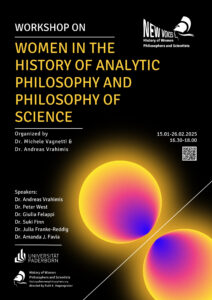Have you heard about our winter term talk series?

During the winter term 2025, an exciting talk series titled “Women in the History of Analytic Philosophy and Philosophy of Science” will take place, organized by Dr. Michele Vagnetti and Dr. Andreas Vrahimis. On the 22.01. Dr. Peter West will held his talk on Dorothy Emmet’s Moral Philosophy:
Dorothy Emmet (1904-2000) was only the second woman in Britain to be a Professor of Philosophy, when she was appointed to the position at Manchester University in 1946. She succeeded Susan Stebbing and, like Stebbing, was the only woman in Britain to be a Professor of Philosophy upon her appointment (Stebbing died in 1943). There is currently almost no secondary literature on Emmet (West 2023 is an exception) and virtually no scholarship on her moral philosophy (aside from Larry Blum’s recent discussions of Emmet in connection to the Wartime Quartet).
Yet, Emmet’s work in moral philosophy makes for fascinating reading. As a student in Oxford she studied under A. D. Lindsay and, like Lindsay, felt almost immediately disillusioned by the moral philosophy she saw taking place around her, which seemed too abstract and detached from the real world. Emmet’s intuitions were further cemented during her summers as a student which she spent teaching Plato’s Republic to miners in Wales. In 1966, she published Rules, Roles and Relations. The central thesis of the text is that moral philosophy should draw on the insights of sociology. Sociology, Emmet argues, informs us that human relations and interactions are too complex and ‘intermingled’ to be subjected to the kind of abstract analysis that moral philosophers typically employ. In particular, Emmet argues that the roles we play in a society (roles like mother, sister, colleague, police officer, teacher, member of parliament, and so on) have a deep influence on the kinds of actions we perform and the morality of those actions.
In this paper, Peter West will reconstruct Emmet’s approach to moral philosophy. He will also argue that, like Stebbing and (afterwards) members of the Wartime Quartet, Emmet felt that modern moral philosophy should take inspiration from Aristotle. Instead of focusing on linguistic analysis of terms like ‘good’ and on atomistic conceptions of interactions between agents, moral philosophy should focus on our character traits, virtues (or what Emmet calls ‘excellences’), and on our ways of living.
All interested parties are warmly invited to attend the talks. The event will be held online via Zoom. Participation is free of charge, but prior registration is required.
More information about the talks and registration can be found here.
We look forward to your participation!
You cannot copy content of this page








